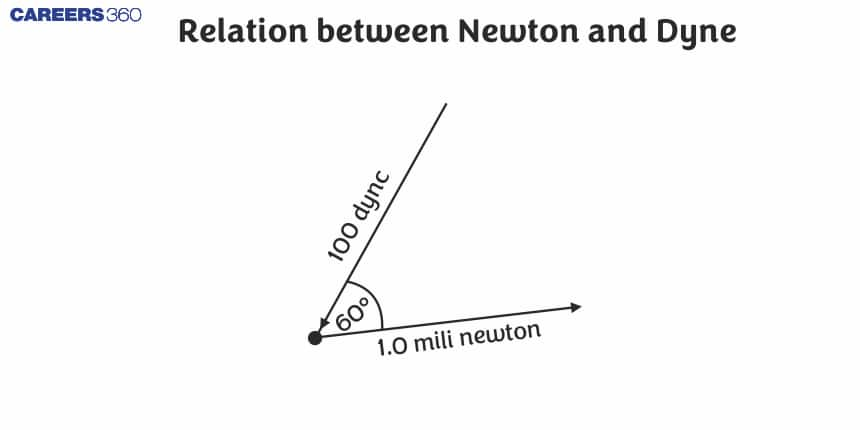Relation between Newton and Dyne
The units of force are the Newton and the Dyne. Under the International System of Units, a Newton is a derived unit for force (SI Units). Under the Centimeter-Gram-Second (CGS) units system, a dyne is also the derived unit of force. In solving difficulties, the relationship between Newton and Dyne is critical. Every physical entity can be measured in a variety of ways in physics. Without breaking the principles of physics or nature, every unit can be related to one another through unit conversions. One Newton is equal to the force of 100,000 dynes.
JEE Main/NEET 2027: Physics Important Formulas for Class 10
NEET 2025: Mock Test Series | Syllabus | High Scoring Topics | PYQs
JEE Main: Study Materials | High Scoring Topics | Preparation Guide
JEE Main: Syllabus | Sample Papers | Mock Tests | PYQs
- What is Newton?
- What is Dyne?
- Difference Between Newton and Dyne
- Relation Between Newton and Dyne

What is Newton?
Newton, abbreviated N, is an absolute unit of force in the International System of Units (SI units). In the centimetre-gram-second (CGS) system, one newton equals 100,000 dynes or around 0.2248 pounds in the foot-poundsecond (English, or customary) system. 1 newton is equal to how many dynes 100000 dynes.
Also, read
- NCERT Solutions for Class 11 Physics
- NCERT Solutions for Class 12 Physics
- NCERT Solutions for All Subjects
What is Dyne?
In the centimeter-gram-second system of physical units, a dyne to newton is the force required to accelerate a free mass of one gram by one centimeter per second per second 0.00001 Newton is one dyne.
1 dyne
Difference Between Newton and Dyne
| Particular | Definition | Symbol | Formula |
Fundamental unit |
| 1 Newton | The force required to accelerate an object of mass 1 kilogram at a rate of 1 m/s2. | N | 1 N=1 kg×1 m/s2 | N=kg⋅m/s2 |
| 1 Dyne | The force required to accelerate an item at 1 cm/s2 in a mass of 1 gram. | Dyne | 1Dyne =1 g×1 cm/s2 | dyne = g.cm /s2 |
Related topic,
| Inertia |
| Common Forces In Mechanics |
| Equilibrium Of Concurrent Forces |
| Newton’s First Law Of Motion |
| Friction |
Relation Between Newton and Dyne
Newton and Dyne have a mathematical relationship in which one Newton equals ten to the fifth power Dyne.
1 Newton
- Newton is the SI unit of force.
- Dyne is the C.G.S unit of force.
Both have been identified as force units in two different systems. As a result, we can begin with a definition
-
1 newton ( N ) is defined as the force required to accelerate an object of mass 1 kg at a rate of
-
Convert mass from kilograms (kg) to grams (g):
Convert acceleration from meters per second squared (
Substitute these into the formula for 1 newton:
Simplify:
Frequently Asked Questions (FAQs)
The units of force are the Newton and the Dyne. A Newton is a derived unit for force followed under the International System of Units (SI Units) (SI Units). Under the Centimeter-Gram-Second (CGS) units system, a dyne is also the derived unit of force.
In the centimeter-gram-second system of physical units, a dyne is the force required to accelerate a free mass of one gramme by one centimeter per second per second. 0.00001 newton is equal to one dyne.
Definition. "The force necessary to accelerate a mass of one gramme at a velocity of one centimetre per second squared," says the dyne. The dyne can also be defined as "that force that, when operating for one second, causes a change in velocity of one centimetre per second in a mass of one gramme."
1500000 dyn = 15 N
There are 981 dynes in I gram weight.
As a result, we'll multiply by 980 to convert from gram-weight to dynes. As a result, 807 gramme weight is 807 multiplied by 980.
The international unit of force measurement is the newton (N). 1 kilogram meter per second squared equals 1 newton. In layman's terms, a newton of force is the amount of force required to accelerate an object weighing one kilogram at one meter per second per second.
The gram-force multiplied by 980.665012 equals the force in dynes.
Also Read
05 Feb'25 04:38 PM
11 Jan'25 03:12 PM
03 Dec'24 04:00 AM
03 Dec'24 03:48 AM
29 Nov'24 11:10 AM
28 Nov'24 01:12 AM
27 Nov'24 11:57 PM
27 Nov'24 02:41 PM
27 Nov'24 02:15 PM
26 Nov'24 03:04 PM

